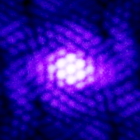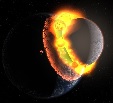|
The Future of Humanity & Intelligent life in the universe
|
|
| soapstermoavinis | Date: Friday, 26.08.2016, 17:28 | Message # 331 |
 Observer
Group: Users
 Pirate
Pirate
Messages: 18
Status: Offline
| I don't know about you but i think we will find a way to live forever,up to the heat death of the universe or when the last star dies at least.I like to be opimistic about things 
Edited by soapstermoavinis - Friday, 26.08.2016, 17:29 |
| |
| |
| DoctorOfSpace | Date: Friday, 26.08.2016, 19:35 | Message # 332 |
 Galaxy Architect
Group: Global Moderators
 Pirate
Pirate
Messages: 3600
Status: Offline
| Quote soapstermoavinis (  ) or when the last star dies at least
We could always harness black holes for energy and extend life into the far future.
Intel Core i7-5820K 4.2GHz 6-Core Processor
G.Skill Ripjaws V Series 32GB (4 x 8GB) DDR4-2400 Memory
EVGA GTX 980 Ti SC 6GB
|
| |
| |
| spacer | Date: Friday, 26.08.2016, 20:13 | Message # 333 |
 Star Engineer
Group: Users
 Israel
Israel
Messages: 1258
Status: Offline
| but if the big crush will happen?
how can we survive that?  
sometimes to be honest i have that fearfull feeling of what will happen when the universe will cease to exist?
i know it will be just nothing...no life, no feeling, nothing....Forever...
"we began as wanderers, and we are wanderers still"
-carl sagan
-space engine photographer
|
| |
| |
| DoctorOfSpace | Date: Friday, 26.08.2016, 20:56 | Message # 334 |
 Galaxy Architect
Group: Global Moderators
 Pirate
Pirate
Messages: 3600
Status: Offline
| Quote spacer (  ) but if the big crush will happen?
All known evidence suggests that won't happen.
Quote spacer (  ) no life, no feeling, nothing....Forever...
That might not be the case, the universe could restart itself
Intel Core i7-5820K 4.2GHz 6-Core Processor
G.Skill Ripjaws V Series 32GB (4 x 8GB) DDR4-2400 Memory
EVGA GTX 980 Ti SC 6GB
|
| |
| |
| spacer | Date: Saturday, 27.08.2016, 00:26 | Message # 335 |
 Star Engineer
Group: Users
 Israel
Israel
Messages: 1258
Status: Offline
| Quote new Big Bang in roughly 10^10^10^56 years
LMAO
but...what if it wont happend. what if there will be really nothing forever.
its really fearfull thought.
"we began as wanderers, and we are wanderers still"
-carl sagan
-space engine photographer
|
| |
| |
| DoctorOfSpace | Date: Saturday, 27.08.2016, 00:58 | Message # 336 |
 Galaxy Architect
Group: Global Moderators
 Pirate
Pirate
Messages: 3600
Status: Offline
| We could always be in a simulation, but assuming we aren't as far as my knowledge on physics goes such states of "nothing" are inherently unstable. It seems incredibly unlikely that nothing will go on forever. Nature seems to balance itself out so it only seems reasonable, to me, that the universe will either restart or a new universe will begin where the old one ends.
Intel Core i7-5820K 4.2GHz 6-Core Processor
G.Skill Ripjaws V Series 32GB (4 x 8GB) DDR4-2400 Memory
EVGA GTX 980 Ti SC 6GB
|
| |
| |
| Aerospacefag | Date: Saturday, 27.08.2016, 01:31 | Message # 337 |
 Pioneer
Group: Users
 Russian Federation
Russian Federation
Messages: 401
Status: Offline
| Quote DoctorOfSpace (  ) We could always be in a simulation, but assuming we aren't as far as my knowledge on physics goes such states of "nothing" are inherently unstable.
The problem with simulation theory is that it is actually not limited in time, space or volume of data involved. IT doesn't have to relay on these things even. With complex enough mathematical apparatus everything can be presented as simulation, including multiple worlds interpretation, time paradoxes, consciousness, and so on.
There was a rather strong statement about nature of Universe, I think it even has it's own name. Say, how do you know that you existed for more than 5 minutes? You have the memory about those 5 minutes and your existence before it. But if your memories (which are actually just a number of chemical reactions in the brain) can be simulated themselves, you can't say with absolutely certainty that you existed for any perceptible amount of time. If our universe has a chance to be a simulation, we can only take refugee in assumption that we are unable to perceive the complexity of it.
|
| |
| |
| steeljaw354 | Date: Saturday, 27.08.2016, 02:16 | Message # 338 |
 World Builder
Group: Users
 Pirate
Pirate
Messages: 862
Status: Offline
| What planet should Humanity conquer when we leave Earth?
|
| |
| |
| Watsisname | Date: Saturday, 27.08.2016, 10:36 | Message # 339 |
 Galaxy Architect
Group: Global Moderators
 United States
United States
Messages: 2613
Status: Offline
| Mars seems like the obvious choice in our solar system. Beyond the solar system, impossible to say without knowing the atmospheres and surface properties. 

|
| |
| |
| DoctorOfSpace | Date: Saturday, 27.08.2016, 12:00 | Message # 340 |
 Galaxy Architect
Group: Global Moderators
 Pirate
Pirate
Messages: 3600
Status: Offline
| Quote Alek (  ) This is "proof" that if our universe is just a computer simulation, this computer would have to be a very, very powerful machine...
Actually it isn't. It could just be running really slow, like one iteration per thousand years in some supercomputer orbiting a black hole near heat death. 
Intel Core i7-5820K 4.2GHz 6-Core Processor
G.Skill Ripjaws V Series 32GB (4 x 8GB) DDR4-2400 Memory
EVGA GTX 980 Ti SC 6GB
|
| |
| |
| DoctorOfSpace | Date: Saturday, 27.08.2016, 12:09 | Message # 341 |
 Galaxy Architect
Group: Global Moderators
 Pirate
Pirate
Messages: 3600
Status: Offline
| Quote Aerospacefag (  ) There was a rather strong statement about nature of Universe, I think it even has it's own name.
Last Thursdayism
Quote Aerospacefag (  ) how do you know that you existed for more than 5 minutes? You have the memory about those 5 minutes and your existence before it. But if your memories (which are actually just a number of chemical reactions in the brain) can be simulated themselves, you can't say with absolutely certainty that you existed for any perceptible amount of time.
While that may be true, it is usually safest to assume it is not the case even if it is.
Quote Aerospacefag (  ) we can only take refugee in assumption that we are unable to perceive the complexity of it.
For the time being. Just because one is in or part of a simulation does not mean that simulation cannot figure out it is a simulation.
When people hear that the universe may be a simulation they tend to go straight to video games, the matrix, or holodecks out of Star Trek. It seems to me it would be more reasonable to assume it is more like our own universe simulations where initial conditions are plugged in and a computer just runs through a process. This could mean our universe has a shelf life of only a few hours, days, or weeks from their perspective and they would never be capable of interacting directly with it.
Perhaps similar to this only orders of magnitude more complex
Intel Core i7-5820K 4.2GHz 6-Core Processor
G.Skill Ripjaws V Series 32GB (4 x 8GB) DDR4-2400 Memory
EVGA GTX 980 Ti SC 6GB
|
| |
| |
| JackDole | Date: Saturday, 27.08.2016, 13:26 | Message # 342 |
 Star Engineer
Group: Local Moderators
 Germany
Germany
Messages: 1742
Status: Offline
| Computer power and time play no role at all, if there is only one individual, in this simulation.
(I'm not saying who is this individual!)
The external time which is required for the simulation is completely independent of the time that elapses within the simulation.
The whole universe, would exists only in the simulated imagination of this individual.
Don't forget to look here.

|
| |
| |
| spacer | Date: Saturday, 27.08.2016, 14:15 | Message # 343 |
 Star Engineer
Group: Users
 Israel
Israel
Messages: 1258
Status: Offline
| its like a paradox!
what if our universe is simulation
and the aliens that in the universe that created our simulation is a simulation
and the aliens that created the other aliens that created our simulation is a simulation.
and so on... 
"we began as wanderers, and we are wanderers still"
-carl sagan
-space engine photographer
|
| |
| |
| DoctorOfSpace | Date: Saturday, 27.08.2016, 14:33 | Message # 344 |
 Galaxy Architect
Group: Global Moderators
 Pirate
Pirate
Messages: 3600
Status: Offline
| Quote spacer (  ) its like a paradox!
what if our universe is simulation
and the aliens that in the universe that created our simulation is a simulation
and the aliens that created the other aliens that created our simulation is a simulation.
Each "world" up has to increase the iteration step. If the complexity within the simulation continually increases exponentially then each consecutive process above has to increase the time in which it takes to run those below. Inevitably you run into an issue where there isn't enough time, energy, or capability within the system to continually run new universes within universes.
Or there could be something deep in the laws of physics that is so simple at its base level that you need only simulate that and from that you could simulate infinities within infinities. %)
Intel Core i7-5820K 4.2GHz 6-Core Processor
G.Skill Ripjaws V Series 32GB (4 x 8GB) DDR4-2400 Memory
EVGA GTX 980 Ti SC 6GB
|
| |
| |
| Alek | Date: Saturday, 27.08.2016, 21:23 | Message # 345 |
 Pioneer
Group: Users
 United States
United States
Messages: 326
Status: Offline
| Quote DoctorOfSpace (  ) Actually it isn't. It could just be running really slow, like one iteration per thousand years in some supercomputer orbiting a black hole near heat death.
Hm...that could be the case too I suppose, though at that rate it would take an extremely long time, as even if it were 1 sec/sec timstep, to simulate the universe so far would take as long as it has so far, and running at a much slower rate like what you stated would take a very much longer time, possibly long enough for this black hole to decay via hawking radiation, that is, if such a thing exists in the
"higher universe"
Though on the coordinate system problem for SE and trying to have moving stars/galaxies, would it be possible to make the stars positions based around a 3D grid centered on each galaxy's center, and that based on an overall grid in inergalactic space itself (sort of the way Newton thought of space: static) that each galaxy's position would be based on, then a grid for each galay would be created as you get within a certain distance of it, based on the center of said galaxy, that each star's position would be based in, and galaxy/star rendering could be done in a nearest-grid-secion-to-farthest sort of manner, almost like a render distance feature, to where only the brightest stars of far secions would be rendered, and smooth transitions could be made for changes between sections, to where not only would it be computationally easier (it wouldn't render stars that can't be seen anyway) this system would also allow inter-section coordinate basing, instead of the strictly universe-based, static "grid" system used now. A similar thing could be used for planetary orbits, if it would make it easier...Probably not, but it could happen...
Living among the stars, I find my way. I grow in strength through knowledge of the space I occupy, until I become the ruler of my own interstellar empire of sorts. Though The world was made for the day, I was made for the night, and thus, the universe itself is within my destiny.
|
| |
| |